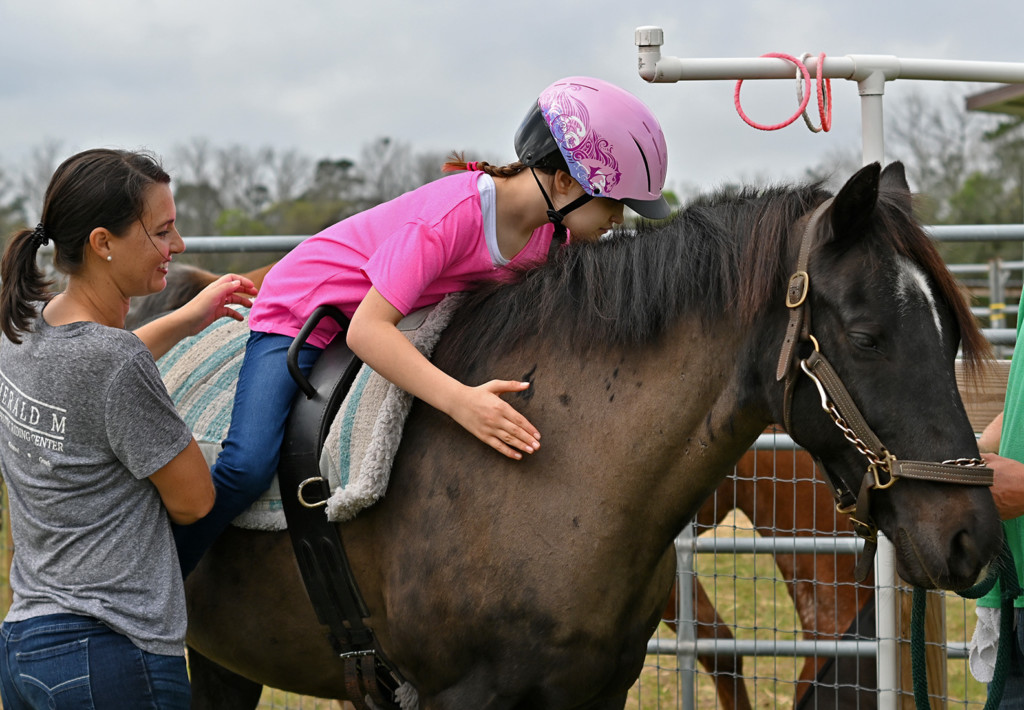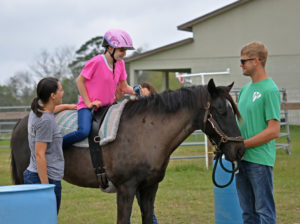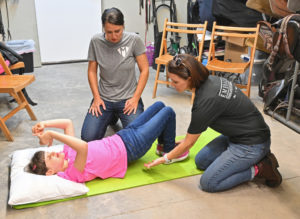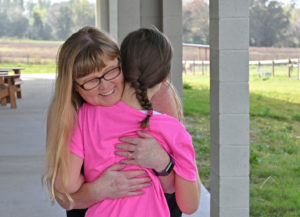
BROOKSVILLE, Fla. — The teenage girl in the bright pink helmet sits astride the dark bay horse with the poise of an experienced equestrian.
“Sarah, can you tell your horse to go?” the physical therapist asks. Sarah gently taps the top of Cappy’s head, and the 1,000-pound beast negotiates the ring at a gentle trot.
For half an hour or so, Sarah and Cappy move as one. Sarah experiences the horse’s movements, which are similar to the human gait. Sessions like this are helping Sarah learn to walk. They’re also helping the 13-year-old, who was born blind, learn balance and coordination.
The therapist guides her through a routine that includes raising her arms, then reaching for a plastic ring and grabbing it. Sarah’s mother, Yvonne Clanton, watches from just outside the fence.
“Yvonne said we were her last hope,” said Lisa Michelangelo, who has worked with Sarah for nearly two years. “She has improved tremendously.”

Sarah was non-verbal and didn’t want to be touched when she first arrived at Emerald M Therapeutic Riding Center, carried in her brother’s arms.
Now, each therapy session ends with Michelangelo asking: “Sarah, can you hug your horse?”
Every time, Sarah leans forward and wraps her arms around Cappy’s neck.
***
Before her adoptive parents named her Sarah, this daughter of a Russian army soldier was named Victoria. But the workers at the Ukraine mental institution where she was sent shortly after her birth never used her name. They never cuddled her. They kept her head shaved.
Born with Peter’s Anomaly, a rare genetic condition that involves thinning and clouding of the cornea, she spent the first five years of her life strapped to a bed.
Yvonne and her husband, Jon, pastor of a local church and chaplain at a nearby state prison, already had two children, but they were captivated by a photo of Victoria that they saw on an international adoption website. Yvonne initially planned to launch a fundraising campaign and encourage a family to adopt Victoria.
“That lasted about three days,” Yvonne said.
Within eight weeks, the Clantons had initiated adoption proceedings and were off to Ukraine to bring their daughter home.
Yvonne recalls seeing Victoria for the first time sitting in a wheelchair in the institution’s foyer. The child could barely move and was unable to hold her body upright. She weighed only 18 lbs. and wore infant-sized clothing.
For the next two-and-a-half months, the couple made daily visits to feed and play with her. They changed her name to Sarah, which means “princess” in Hebrew.
After each visit, a worker would return the child to her small cot and apply three straps, one across her chest, one at her waist and one across her thighs.
“They told us she was mentally retarded, that she would never walk or talk,” Yvonne said. “They said, ‘She’s always going to be a vegetable.’ ”
The staff’s attitude changed when the Clantons brought their son Sam to visit. Born with the same condition as Sarah, as well as cerebral palsy, he had learned to walk.
“It’s like they began trusting us more,” Yvonne said.
***
https://youtu.be/bJ462heH1xs
Back home, the family’s challenges were just beginning. Their pediatrician told them Sarah was only months from dying when they rescued her.
After they got her stabilized, they enrolled her in the Hernando County School District’s hospital homebound program for medically fragile children, but it wasn’t a good fit. Then they learned that both Sarah and Sam were eligible for the Gardiner Scholarship, which helps Florida families individualize education plans for their children with certain special needs.
Created in 2014, the scholarship currently serves more than 13,000 students. It differs from other state scholarship programs in that it provides an education savings account that parents can use to direct money toward a combination of programs and approved providers. Approved expenses include tuition, therapy, curriculum, technology and a college savings account.
The Clantons used Gardiner funds to send Sarah and Sam to a small private school. But Sam got sick and had to be hospitalized, so Yvonne opted to homeschool both children.
Meanwhile, the family experimented with many therapies to help Sarah gain more independence. Her strength improved, but she still had no motor control. And because she was blind, she had trouble orienting herself. Therapists told the family she probably would never walk. Invest in a handicap-accessible van, they suggested.
As Sarah grew, it became more and more difficult for Yvonne to carry her and to lift her in and out of the bathtub. Then she remembered seeing an Emerald M flier at Sarah’s former private school, and she made what turned out to be a life-changing phone call.

The 20-acre center nestled in the rolling hills of eastern Hernando County has been providing horse therapy to veterans and special needs children for four years. Among its offerings is hippotheraphy, a modality used by physical, occupational and speech therapists to utilize the movements of a horse to assist clients with motor and sensory impairments. Luckily for the Clantons, Emerald M has been an approved Gardiner Scholarship program provider since 2016. They were able to use their scholarship funds to pay for Sarah’s twice-a-week horse therapy.
“It’s been tremendous in servicing our families who may not be able to afford this type of therapy for their child,” Michelangelo said, noting that not all health insurance providers cover horse therapy.
But even with the financial burden lifted, the therapist knew Sarah would have challenges given what she endured in Ukraine.
“She had no concept of where the placement of her feet were,” Michelangelo said. “The legs were crisscrossing and scissoring, her knees were giving way, her hips were buckling. Her pelvis was all over.”
Residual traumatic stress caused Sarah to fear noise and touch. She balked at getting close to the horse’s face. Michelangelo positioned her on a bareback pad so she could better feel the horse move beneath her. Within weeks, the therapy team started seeing improvements. Sarah’s core strengthened. She became more aware of her movements. She began maneuvering better.
The team then had her touch the horse’s face and feel its breath. Michelangelo put her hand over Sarah’s, guiding her to make the horse move forward by tapping it twice. Now Sarah can command the horse to move on her own.
“It just blows my mind because … she’s never seen a horse,” Michelangelo said. “She has no idea what it looks like, but she trusts that he’s here to help her.”
***

Sarah’s progress extends beyond the ring at Emerald M. Her sessions there, combined with more traditional physical therapy, have made it possible for her to get in and out of the bathtub with only a handhold from Yvonne. She can move from one couch to another in the family’s living room and can navigate the van on her own.
She’s also developing verbal skills, saying “yeah” and making an “n” sound for no.
Yvonne, who still carries with her the photo of Sarah at age 5, wishes her daughter’s former caregivers could see her now, benefiting from equipment purchased with Gardiner funds including a record player, rocking toys for vision-impaired children and an indoor foam slide.
“Here’s this little kid who was tied to a bed in Ukraine, and she’s in my living room throwing herself down the slide, just like any other kid would do,” Yvonne said.
She credits the Gardiner Scholarship for giving Sarah a second chance.
“Gardiner is an incredible thing to have in our family, and we are so completely grateful for it,” she said. “It has changed our lives.”


